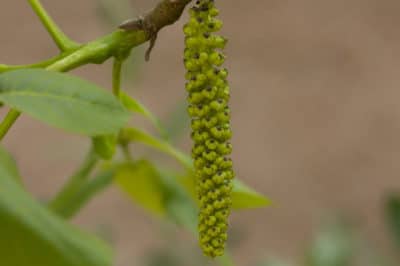The Problem
Why do pecan trees bloom twice each spring? Because when a tree’s male flowers pollinate its female ones, most of the resulting seedlings die before they’re old enough to bloom. In other words, self-pollinating pecan trees almost never pass on their genes.
The Solution
Luckily for the trees, Mother Nature has ensured that they can’t self pollinate. She did this by dividing them into types:
- Type I, or protandrous, trees have their male flowers bloom first on the ends of the previous season’s growth. They release their pollen and die up to a week before the female flowers bloom.
- On Type II or protogynous trees, the female flowers bloom first. When they’re no longer capable of receiving pollen, the male flowers release it.
Why didn’t this system wipe pecan trees out after a single generation? Mother Nature has also seen to it to it that nearly equal numbers of both types of trees are producing or receiving pollen throughout the blooming period.
Making the System Work for You
Because it can’t self pollinate, every pecan tree should be grown with at least one other compatibly cross-pollinating cultivar. In other words, its female flowers should be receptive when its companion is producing pollen, and vice versa.
But there’s a catch. Factors besides type also influence when pecan trees bloom. Age has an effect, as does the location of the flowers on the trees. Those on lower, interior branches often bloom and shed or receive pollen earlier than those higher up.
Cultivars that leaf out early in spring usually bloom early as well. And where pecan trees grow in USDA plant hardiness zones 6 through 9, spring weather changes from location to location and year to year.
What to Do?
The best way to ensure successful pollination of pecan trees is to plant them with three or four varieties of compatible cross pollinators. It greatly improves the odds of one tree shedding pollen when another one is receptive.
Expert gardener’s tip: Planting pecan trees 60 to 80 feet apart allows the wind pollination they rely on while giving them plenty of room to grow.
